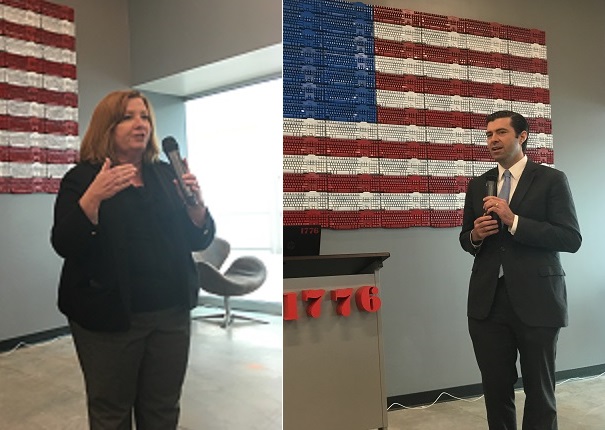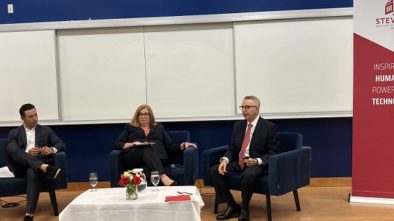NJEDA Programs for Early-Stage Startups and Investors Aim to Jumpstart New Jersey’s Innovation Ecosystem
At the recent Founders & Funders event, hosted on May 9 by the New Jersey Economic Development Authority (NJEDA), Tim Sullivan, NJEDA’s CEO, and Kathleen Coviello, vice president, technology and life sciences investments, outlined the extraordinary effort the NJEDA makes to connect early-stage companies with investment dollars.
At Founders & Funders, startup founders get to have 10-minute meetings with potential investors. This is a foot in the door, as the founders are guaranteed “warm” introductions because they’ve already been prequalified by the NJEDA. They are also assigned an NJEDA official to whom they can turn for advice or information. The founders can then start developing relationships with a number of investors who may be able to help them in the future.
As Sullivan said in his talk at the event, it’s all about “doing more of what we are doing today, bringing together entrepreneurs and capital, and trying to create that ecosystem and that fertile soil, so lots of good things can happen and lots of companies, ideas and innovations can be brought to the marketplace.”
Programs for Incubators, Accelerators and Coworking Spaces
This year’s Founders & Funders took place at the beautiful and startup-friendly 1776 coworking space that opened in January at the Cherry Hill Mall. The Cherry Hill venue is the company’s tenth coworking space, but its first retail and ecommerce foray, according to CEO Jennifer Maher, and it’s the company’s first work space in a mall.
Highlighting coworking spaces, accelerators and incubators is something the NJEDA regularly does, and at the recent Founders & Funders event, Coviello mentioned that there were 90 coworking spaces in New Jersey, “but the visibility isn’t there.”
NJTechWeekly.com has been on some tours of spaces with NJEDA officials. As they went through these venues, they would talk with tech founders and others working in them, and with the people who run them, in order to generate some publicity for the spaces. Collaborative work spaces are important for the development of a tech ecosystem, Coviello noted, because they provide supportive communities for young companies.
“It’s a relatively small intervention, but we think it is an important catalyst to helping direct the scarce capital that exists into places we think will have the biggest return,” Tim Sullivan
The NJEDA has also been working to fill these spaces with promising young companies. The NJ Ignite program is intended to be a win-win for all participants, as coworking spaces attract new tenants through the program, and startups get their rent paid for up to six months. Sullivan noted that, with NJ Ignite, emerging companies can thus utilize their scarce resources to drive as much capital as possible towards their R&D and important hires, rather than towards rent.
“It’s a relatively small intervention, but we think it is an important catalyst to helping direct the scarce capital that exists into places we think will have the biggest return,” he said. NJ Ignite also offers bonuses for minority- and women-owned firms because “we want to build the most diverse startup ecosystem in America,” Sullivan said.
Bringing More Venture Capital to New Jersey
The NJEDA has also been working to bring more venture capital to New Jersey. “Our governor likes to talk about the fact that, before there was a Silicon Valley, there was New Jersey, and places like Bell Labs and Sarnoff Labs,” which performed R&D that eventually led to commercialized products, Sullivan said.
“That engine hasn’t been firing in the same way it did in the last 15 or 20 years,” he added, noting that it’s essential that we in New Jersey get back to what we’ve done before, and to what we’ve led the nation in, by helping to start, grow and scale young companies, so they become big companies.
“That’s been the missing part of our economic development story,” Sullivan continued. “What we haven’t seen are enough companies that go from two or three people to 20 or 50 people, to 500 to 1,000 or 10,000. … That’s what we are laser focused on. “
The Innovation Evergreen Fund is proposed to help spur the kind of “outsized job creation we need to grow our economy.” Tim Sullivan
The Innovation Evergreen Fund is proposed to help spur the kind of “outsized job creation we need to grow our economy.” The NJEDA team came up with this idea, and is championing it, he said.
“The Innovation Evergreen Fund will use tax credits in an innovative kind of way. We would auction tax credits to big companies, and the big companies would bid [based on] on two things: 1) price, what they want to pay for the tax credit; and 2) what they plan to do to support the innovation ecosystem. That could mean lots of things, Sullivan explained, for instance, hosting a coworking space, mentoring young startups or opening their supply chain purchasing processes to less mature companies.”
He noted that across the country, in thriving innovation centers, there are close relationships among large companies, academic institutions and startups. The companies that receive investments from the Innovation Evergreen Fund won’t just generate dollars, but “high value dollars.” The startup’s relationship to the companies who receive the tax credits and invest in them will provide them with a competitive advantage.
Also, the proceeds from the tax credit auctions will be paired with private venture capital. Private VCs will still be making the investment decisions, but investors will bring their projects to the state government.
Apply to the Net Operating Loss Program by June 30
Speaking to the Founder & Funders attendees, Coviello went over all the other programs that the NJEDA offers to support young companies, including Research with New Jersey, a database of all the research activities going on in the state.
Probably the most important NJEDA program aimed at companies with intellectual property and R&D losses is the Technology Business Tax Certificate Transfer Program, also known as the “Net Operating Loss (NOL) Program.” We’ve talked about this program previously. Companies that qualify can get awards that are usually about $1 million, which are given to help them hire, expand or do more research. There is a $60 million pool. One life sciences company in Lawrenceville got an $11 million award last year, Coviello noted.
“Where else can you get an award of about a million dollars, give up no equity and have a six-week turnaround time?” Kathleen Coviello
The deadline is June 30. “You’ll know the middle of August whether or not you are recommended for approval,” she said. “Where else can you get an award of about a million dollars, give up no equity and have a six-week turnaround time?”
She also noted that the 10 percent Angel Investor Tax Credit is a way to de-risk an angel’s investment and enhance the internal rate of return for investors. If the investors are from out of state, New Jersey will send them a check to encourage them to make more investments in the state. There are some qualifications that the investment recipient must meet, and many entrepreneurs who meet these qualifications include this information in their pitch decks to attract angel investment, she said.




